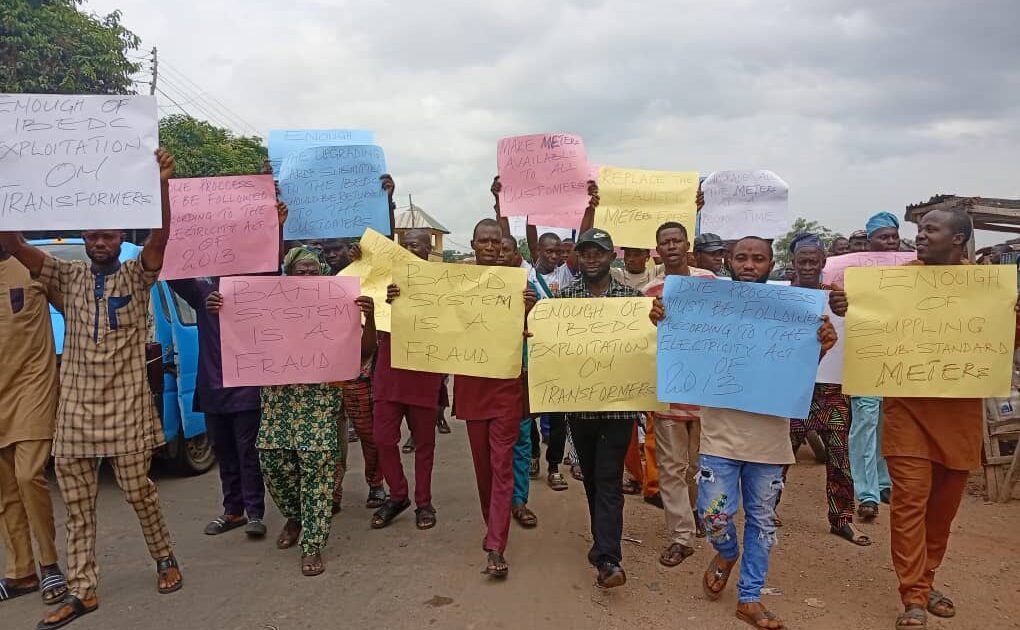Paragraph 1: The Protest and Accusations
Members of the Licensed Electrical Contractors Association of Nigeria (LECAN) in Osun State staged a public demonstration against the Ibadan Electricity Distribution Company (IBEDC), alleging a range of exploitative practices targeting electricity consumers. The protesting contractors marched through the streets of Osogbo, carrying placards denouncing IBEDC’s alleged fraudulent activities and demanding an end to what they described as the company’s exploitation of customers. At the heart of their grievances was the accusation that IBEDC staff were overstepping their authority and encroaching on the professional duties of licensed electrical contractors, in violation of the Electricity Act of 2013. LECAN asserted that IBEDC employees were usurping responsibilities specifically designated for licensed contractors, thereby creating a monopolistic and exploitative environment for customers.
Paragraph 2: Exploitation and Overcharging
LECAN’s Chairman, Kayode Adebayo, addressed the media, detailing several instances of alleged misconduct by IBEDC. He accused IBEDC of making the process of obtaining a meter unnecessarily difficult and expensive, turning a routine procedure into an opportunity for extortion. Adebayo claimed that IBEDC staff were charging exorbitant fees for new electricity connections and imposing unjustified upfront charges on newly created accounts, even before customers began consuming electricity. This practice, he argued, directly contravened the Electricity Act and placed undue financial burdens on unsuspecting customers. He highlighted cases where customers were saddled with debts of N100,000 or more on their newly created accounts, forcing them to pay for services they never received. This exploitative practice, according to Adebayo, was designed to enrich IBEDC at the expense of its customers.
Paragraph 3: Metering Controversies and the "Band A" Fraud
The issue of metering emerged as a central point of contention between LECAN and IBEDC. Adebayo accused IBEDC of withholding customer meter cards submitted for upgrades, leaving customers without a means to recharge their meters and forcing them onto estimated billing, which is often inflated. He also challenged the effectiveness and transparency of IBEDC’s “Band” system, particularly "Band A", alleging it to be a fraudulent scheme designed to further exploit customers. This system, according to LECAN, lacked transparency and accountability, allowing IBEDC to manipulate billing and extract undue payments from customers.
Paragraph 4: Transformer Acquisition and Connection Issues
LECAN further accused IBEDC staff of exploiting residents seeking to acquire, replace, or repair transformers. They alleged that IBEDC employees were demanding bribes and kickbacks for these services, creating an environment of corruption and hindering access to reliable electricity. Furthermore, LECAN claimed that even after transformers were installed, IBEDC staff would deliberately delay their connection to the national grid, demanding further "PR" (presumably payments or favors) before energizing them. This practice, according to LECAN, not only constitutes extortion but also deprives communities of essential electricity services.
Paragraph 5: IBEDC’s Response and Denials
In response to the allegations, IBEDC’s Regional Communication Officer, Kikelomo Owoeye, issued a statement denying all accusations of wrongdoing. She maintained that IBEDC operates with transparency and adheres to all regulatory guidelines. Owoeye addressed the allegations of pre-connection billing, explaining that charges might arise from electricity usage during building construction, but only after customer consent and with available resolution mechanisms. She attributed delays in metering to fraudulent attempts to use single receipts for multiple meters and reiterated IBEDC’s commitment to providing meters to customers with valid proof of payment.
Paragraph 6: IBEDC’s Explanation of Metering and Card Reconfiguration
Regarding the discontinued card reconfiguration program, Owoeye clarified that it was a time-limited amnesty initiative and the deadline had passed. She addressed the issue of faulty meters, stating that replacements are handled based on the cause of the fault. If customer misuse is determined to be the cause, the customer bears the replacement cost. However, if the fault stems from a manufacturing defect, IBEDC covers the replacement within a specified timeframe. During the replacement period, customers are placed on a NERC-approved capped billing system to ensure continued electricity supply. Owoeye’s statement aimed to refute LECAN’s accusations, portraying IBEDC as a responsible and compliant organization while attributing some issues to customer misconduct or the limitations of specific programs. However, it did not directly address the allegations of extortion and bribery related to transformers and new connections, leaving a significant gap in IBEDC’s response.














